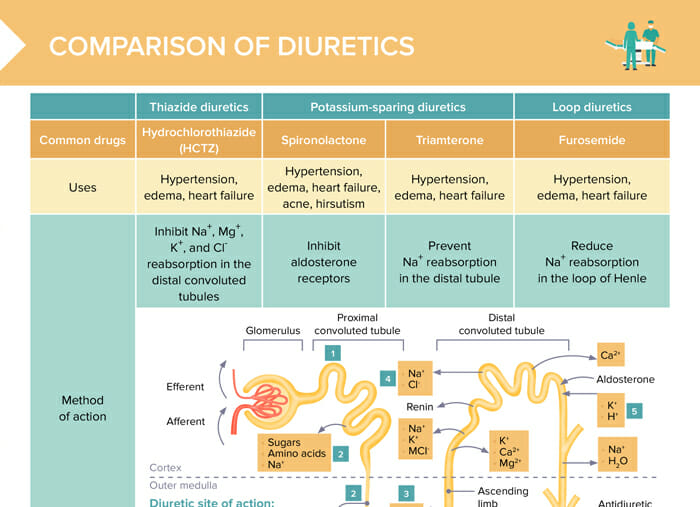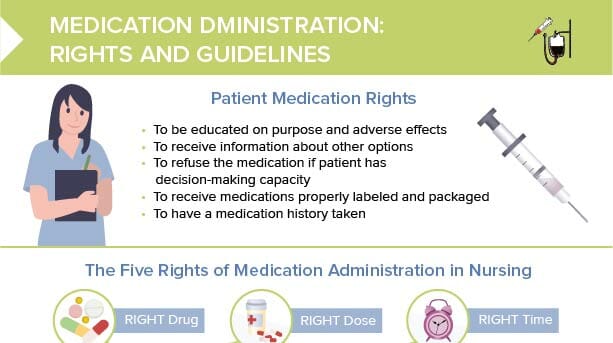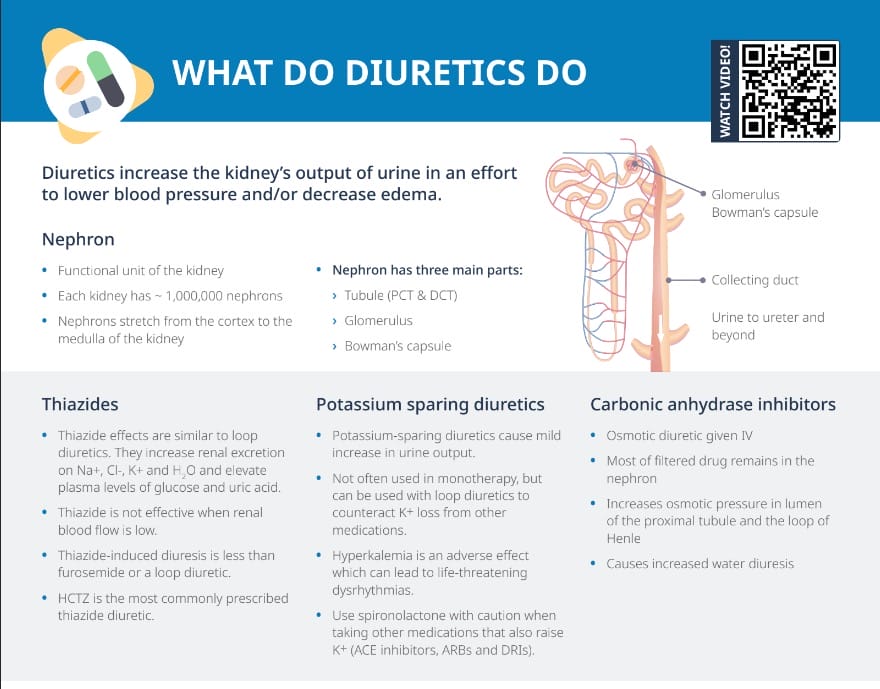What are diuretics?
Diuretics are medications that increase the kidney’s production and output of urine in an effort to lower blood pressure and/or decrease edema. They’re commonly used to treat conditions like hypertension (high blood pressure), heart failure, and edema (fluid buildup).
What are the types of diuretics?
Loop diuretics
- Limit reabsorption of Na+ and Cl–, increasing urine production
- Work in loop of Henle to remove salt and excess water
- Furosemide is commonly used.
Thiazides
- Thiazide effects are similar to loop diuretics. They increase renal excretion on Na+, Cl–, K+ and H2O and elevate plasma levels of glucose and uric acid.
- Thiazide is not effective when renal blood flow is low.
- Thiazide-induced diuresis is less than loop diuretic.
- HCTZ is the most commonly prescribed thiazide diuretic.
Potassium-sparing diuretics
- Potassium-sparing diuretics cause mild increase in urine output.
- Not often used in monotherapy, but can be used with loop diuretics to counteract K+ loss from other medications.
- Hyperkalemia is an adverse effect which can lead to life-threatening dysrhythmias.
- Use spironolactone with caution when taking other medications that also raise K+ (ACE inhibitors, ARBs and DRIs).
- Removes salt and water without removing excess potassium
Carbonic anhydrase inhibitors
- Osmotic diuretic given IV
- Most of filtered drug remains in the nephron
- Increases osmotic pressure in lumen of the proximal tubule and the loop of Henle
- Causes increased water diuresis

Comparison chart of diuretics
A comparison of thiazide, loop diuretics, and potassium-sparing diuretics
How do diuretics work?
Mechanism of action of loop diuretics
Loop diuretics (e.g., furosemide) reduce Na+ reabsorption in the loop of Henle.
Mechanism of action of thiazides
Thiazides (e.g., hydrochlorothiazide) inhibit Na+, Mg+, K+, and Cl– reabsorption in the distal convoluted tubules.
Mechanism of action of potassium-sparing diuretics
Potassium-sparing diuretics (e.g., spironolactone, triamterone) inhibit aldosterone receptors or prevent Na+ reabsorption in the distal tubule.
Related videos
What is a nephron?
A nephron is a functional unit of the kidney. Each kidney has about 1,000,000 nephrons. Nephrons stretch from the cortex to the medulla of the kidney. Each nephron has three parts:
- Tubule (PCT & DCT)
- Glomerulus
- Bowman’s capsule
What are diuretics used for?
Table: Indications of different types of diuretics
| Thiazide diuretics | Potassium-sparing diuretics | Loop diuretics | ||
| Common drugs | Hydrochlorothiazide | Spironolactone | Triamterene | Furosemide |
| Uses | Hypertension,edema, heart failure | Hypertension, edema, heart failure, acne, hirsutism | Hypertension, edema, heart failure | Hypertension, edema, heart failure |
Side effects of diuretics: comparison
Table: Side effects of different types of diuretics
| Thiazide diuretics | Potassium-sparing diuretics | Loop diuretics | ||
| Common drugs | Hydrochlorothiazide | Spironolactone | Triamterene | Furosemide |
| Side effects | Hypokalemia, hyponatremia, photosensitivity | Hyperkalemia, lightheadedness, gynecomastia | Hypokalemia, hyponatremia, hypomagnesemia | |
Nursing teachings for diuretics
- Take medication as directed.
- Elderly and fall-risk patients should take any evening doses by early evening.
- Educate for fluid intake as ordered by provider.
- Monitor for weight changes.
- Maintain follow-up visits.
What foods are natural diuretics?
Many foods and beverages have natural diuretic properties, including:
- Watermelon
- Cucumber
- Lemon
- Pineapple
- Ginger
- Parsley
- Celery
- Berries
- Beets
- Green tea
- Asparagus
- Coffee (caffeine)
- Grapes
- Apple cider vinegar
When to stop diuretics in heart failure
The decision to discontinue diuretics or adjust the dose for clients with heart failure is made by the supervising physician.
Considerations influencing the decision to discontinue diuretics can include the following:
- If symptoms of fluid overload or congestion stop (clinical stability)
- Risk of hypotension present
- Electrolyte imbalances present
- Decline in kidney function
- Interactions with other medications
- Client’s weight drops significantly

